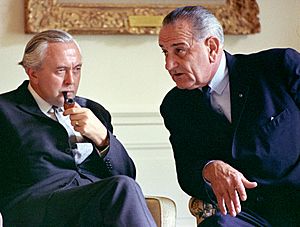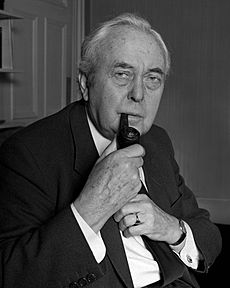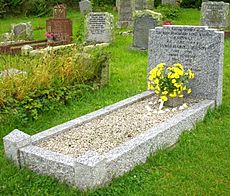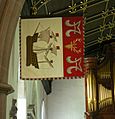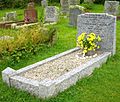Harold Wilson facts for kids
Quick facts for kids
The Lord Wilson of Rievaulx
|
|||||||||||||||||||||||||||||||||||||
|---|---|---|---|---|---|---|---|---|---|---|---|---|---|---|---|---|---|---|---|---|---|---|---|---|---|---|---|---|---|---|---|---|---|---|---|---|---|
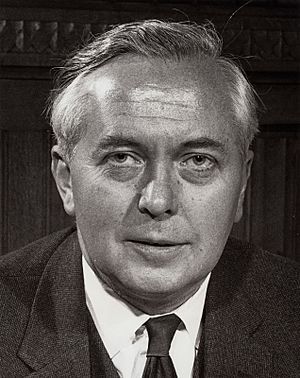
Wilson in 1962
|
|||||||||||||||||||||||||||||||||||||
| Prime Minister of the United Kingdom | |||||||||||||||||||||||||||||||||||||
| In office 4 March 1974 – 5 April 1976 |
|||||||||||||||||||||||||||||||||||||
| Monarch | Elizabeth II | ||||||||||||||||||||||||||||||||||||
| Preceded by | Edward Heath | ||||||||||||||||||||||||||||||||||||
| Succeeded by | James Callaghan | ||||||||||||||||||||||||||||||||||||
| In office 16 October 1964 – 19 June 1970 |
|||||||||||||||||||||||||||||||||||||
| Monarch | Elizabeth II | ||||||||||||||||||||||||||||||||||||
| First Secretary | |||||||||||||||||||||||||||||||||||||
| Preceded by | Alec Douglas-Home | ||||||||||||||||||||||||||||||||||||
| Succeeded by | Edward Heath | ||||||||||||||||||||||||||||||||||||
| Leader of the Labour Party | |||||||||||||||||||||||||||||||||||||
| In office 14 February 1963 – 5 April 1976 |
|||||||||||||||||||||||||||||||||||||
| Deputy |
|
||||||||||||||||||||||||||||||||||||
| Preceded by | Hugh Gaitskell | ||||||||||||||||||||||||||||||||||||
| Succeeded by | James Callaghan | ||||||||||||||||||||||||||||||||||||
| Leader of the Opposition | |||||||||||||||||||||||||||||||||||||
| In office 19 June 1970 – 4 March 1974 |
|||||||||||||||||||||||||||||||||||||
| Monarch | Elizabeth II | ||||||||||||||||||||||||||||||||||||
| Prime Minister | Edward Heath | ||||||||||||||||||||||||||||||||||||
| Preceded by | Edward Heath | ||||||||||||||||||||||||||||||||||||
| Succeeded by | Edward Heath | ||||||||||||||||||||||||||||||||||||
| In office 14 February 1963 – 16 October 1964 |
|||||||||||||||||||||||||||||||||||||
| Monarch | Elizabeth II | ||||||||||||||||||||||||||||||||||||
| Prime Minister |
|
||||||||||||||||||||||||||||||||||||
| Preceded by | George Brown | ||||||||||||||||||||||||||||||||||||
| Succeeded by | Alec Douglas-Home | ||||||||||||||||||||||||||||||||||||
|
|||||||||||||||||||||||||||||||||||||
|
|||||||||||||||||||||||||||||||||||||
|
|||||||||||||||||||||||||||||||||||||
| Personal details | |||||||||||||||||||||||||||||||||||||
| Born |
James Harold Wilson
11 March 1916 Huddersfield, Yorkshire, England |
||||||||||||||||||||||||||||||||||||
| Died | 24 May 1995 (aged 79) London, England |
||||||||||||||||||||||||||||||||||||
| Resting place | St Mary's Old Church, St Mary's, Isles of Scilly, England | ||||||||||||||||||||||||||||||||||||
| Political party | Labour | ||||||||||||||||||||||||||||||||||||
| Spouse | |||||||||||||||||||||||||||||||||||||
| Children | 2, including Robin | ||||||||||||||||||||||||||||||||||||
| Alma mater | Jesus College, Oxford | ||||||||||||||||||||||||||||||||||||
| Occupation |
|
||||||||||||||||||||||||||||||||||||
| Profession | Civil servant | ||||||||||||||||||||||||||||||||||||
| Signature | |||||||||||||||||||||||||||||||||||||
James Harold Wilson (born March 11, 1916 – died May 24, 1995) was an important British politician. He was the Prime Minister of the United Kingdom two times. He led the country from October 1964 to June 1970, and again from March 1974 to April 1976.
Harold Wilson was also the leader of the Labour Party from 1963 to 1976. He was a Member of Parliament (MP) for many years, from 1945 to 1983. He is the only Labour Party leader who won four general elections.
Born in Huddersfield, England, Harold Wilson came from a family interested in politics. He earned a scholarship to Royds Hall Grammar School and later studied at Jesus College, Oxford. He became a university lecturer before entering politics.
In 1945, Wilson was elected to Parliament. He quickly joined the government as a junior minister. By 1947, he became the President of the Board of Trade, a very important job. In 1963, he became the leader of the Labour Party.
Wilson led Labour to victory in the 1964 election. His first time as prime minister saw many social changes in the UK. These included making male homosexuality legal in England and Wales and changing divorce laws. His government also created the Open University, which allowed adults to study for degrees later in life.
After losing the 1970 election, Wilson became the Leader of the Opposition. He returned as prime minister in 1974 after another election. During his second term, Britain held a referendum to decide if it should stay in the European Communities (now the European Union). The public voted to stay.
In March 1976, Harold Wilson suddenly announced he was stepping down as prime minister. He said he had always planned to retire at 60. He was replaced by James Callaghan. Wilson remained an MP until 1983, then became a member of the House of Lords.
Contents
- Early Life and Education
- Member of Parliament (1945–1964)
- First Period as Prime Minister (1964–1970)
- Defeat and Return to Opposition (1970–1974)
- Second Period as Prime Minister (1974–1976)
- Retirement and Death (1976–1995)
- Political Style and Public Image
- Honours and Tributes
- Scholastic Honours
- Images for kids
- See also
Early Life and Education
Harold Wilson was born in Huddersfield, Yorkshire, England, on March 11, 1916. His family was very interested in politics. His father, James Herbert Wilson, was a chemist who was active in the Liberal Party and later joined the Labour Party. His mother, Ethel, was a schoolteacher.
When Harold was eight, he visited London and had a famous photo taken of him standing outside 10 Downing Street, the Prime Minister's home. At ten, he went to Australia with his family. On the way home, he told his mother he wanted to be prime minister.
School and University
Wilson won a scholarship to Royds Hall Grammar School in Huddersfield. When his father lost his job, the family moved to Spital in Cheshire. Harold finished his schooling at Wirral Grammar School for Boys, where he was the Head Boy.
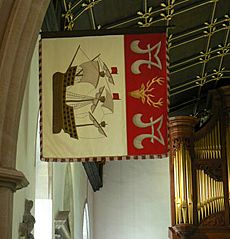
Harold did very well in school. He earned a special scholarship that helped him study Modern History at Jesus College, Oxford, starting in 1934. At Oxford, he was involved in politics as a member of the Liberal Party. His tutor thought he was the best student he ever had. He graduated with top honors and many academic awards.
At just 21 years old, he became one of the youngest university teachers at Oxford. He taught Economic History at New College from 1937 and was a research fellow at University College.
Family Life
On January 1, 1940, Harold Wilson married Mary Baldwin. She was a published poet. They had two sons, Robin and Giles. Robin became a professor of Mathematics.
Work During World War II
When World War II started, Wilson wanted to join the military. However, he was considered a specialist and worked for the government instead. He helped William Beveridge study unemployment. Wilson later became a statistician and economist for the coal industry. He was recognized for his work and received an award called the OBE.
He loved statistics and became a member of the Royal Statistical Society in 1943. As President of the Board of Trade, he helped create a law about economic statistics that is still used today.
Member of Parliament (1945–1964)
As the war ended, Harold Wilson looked for a place to run in the upcoming election. He was chosen to represent Ormskirk. He had to leave his government job to become a candidate. During this time, he wrote a book called A New Deal for Coal, arguing that coal mines should be owned by the government to make them more efficient.
In the 1945 general election, Wilson won his seat easily. The Labour Party won by a lot. Prime Minister Clement Attlee immediately made him a junior minister in the Ministry of Works. Two years later, he became Secretary for Overseas Trade. In this role, he traveled to the Soviet Union to arrange trade deals.
The boundaries of his Ormskirk area changed before the 1950 election. He then ran for the new seat of Huyton near Liverpool and won by a small margin. He represented Huyton for 33 years until 1983.
Cabinet Minister, 1947–1951
Ending Wartime Controls
On September 29, 1947, Wilson became the President of the Board of Trade. At 31, he was the youngest person in a British government cabinet in the 20th century. He wanted to reduce wartime rationing, calling it a "bonfire of controls." He believed too many controls were slowing down the country's return to normal life.
He ended rationing for potatoes, bread, jam, shoes, and some clothes. By November 1948, he announced that his department had removed the need for over 200,000 licenses. By March 1949, he promised to remove 900,000 more. This success helped him become known as a modern and skilled politician.
Working with Other Ministers
In 1949, when the Chancellor of the Exchequer, Stafford Cripps, was ill, Wilson was part of a group of young ministers who advised Prime Minister Attlee on money matters. These ministers were Douglas Jay and Hugh Gaitskell. Wilson's reputation was sometimes seen as self-important. When Cripps stepped down in 1950, Wilson was not considered for the top job of Chancellor.
Wilson became known as a left-wing politician in the Labour Party. In April 1951, he resigned from the government with Aneurin Bevan to protest new charges for medical services in the National Health Service (NHS). This was due to the costs of the Korean War.
After Labour lost the 1951 election, Wilson became the chairman of a left-wing political group.
Shadow Cabinet, 1954–1963
In 1954, Wilson joined the Shadow Cabinet. This group of politicians challenges the government when their party is not in power. He became Shadow Chancellor of the Exchequer in 1955 and was very good at it. He even made up the term "Gnomes of Zürich" to make fun of Swiss bankers.
Wilson also led an investigation into the Labour Party's organization after they lost the 1955 election. His report said the party's organization was like an old "penny farthing" bicycle and suggested many improvements.
In 1960, Wilson challenged Hugh Gaitskell for the leadership of the Labour Party but did not win. He then became Shadow Foreign Secretary in 1961.
Opposition Leader, 1963–64
Hugh Gaitskell died suddenly in January 1963. The Labour Party then needed a new leader. Wilson won the leadership election. He became the Leader of the Labour Party and the Leader of the Opposition.
At the party's meeting in 1963, Wilson gave a famous speech about how science and technology would change Britain. He said that the "white heat of this revolution" would make Britain a place for new ideas. This speech helped him seem like a modern leader.
The Labour Party's 1964 election campaign was helped by problems in the government. Wilson used this to his advantage. The Conservative Prime Minister, Alec Douglas-Home, was an aristocrat. Wilson joked that he was out of touch with ordinary people.
First Period as Prime Minister (1964–1970)
Labour won the 1964 general election by a small number of seats. Harold Wilson became prime minister. In March 1966, Wilson called another election, and Labour won by a much larger number of seats.
Changes in Britain
The Labour government from 1964 to 1970 made many changes. These included improvements in social security, housing, health, and education.
One of the most remembered changes was the social reforms led by Home Secretary Roy Jenkins. These included:
- Ending capital punishment (the death penalty).
- Making male homosexuality legal in England and Wales.
- Changing divorce laws.
- Ending theatre censorship.
- Laws to address race relations and racial discrimination.
His government also made it easier for people to get welfare benefits. They linked pensions to how much people earned. They also improved benefits for people injured at work.
Education for Everyone
Education was very important to Wilson. His government spent more money on education than on defense for the first time in British history. Wilson continued to create new universities.
He also started the Open University. This was a new idea to give adults a second chance to get a university degree through distance learning. By 1981, 45,000 students had earned degrees from the Open University.
Wilson's government also pushed for Comprehensive schools. These schools would serve all children, not just those who passed a special exam called the "eleven-plus." From 1966 to 1970, the number of children in comprehensive schools grew from about 10% to over 30%.
Spending on education increased a lot. The number of teachers in training went up by more than a third. More students stayed in school after age sixteen. This helped improve opportunities for children from working-class families.
Housing and City Improvements
Housing was a big focus for Wilson's first government. More new houses were built during his time in office than in the six years before. The number of council homes (government-owned housing) built increased steadily. Between 1965 and 1970, 1.3 million new homes were built.
To help people buy their own homes, the government started the Option Mortgage Scheme in 1968. This helped people with lower incomes get help with their mortgage payments.
The government also focused on improving cities. Money was given to local areas with high poverty. The Housing Act 1969 helped local authorities improve 'unsatisfactory areas.' From 1968 to 1970, 150 new schools were built in these areas.
Health and Social Care
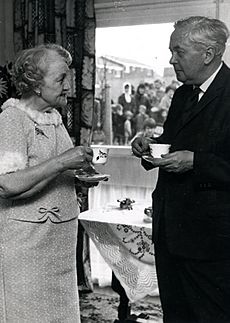
Spending on the National Health Service (NHS) increased from 4.2% of the country's wealth in 1964 to about 5% in 1969. This extra money helped build more health centers and hospitals. It also led to more hospital staff.
In 1966, doctors received an 11% pay increase. Nurses also got a large pay raise. These changes helped improve morale among health workers. In 1967, local authorities were allowed to provide free family planning advice. The Clean Air Act 1968 was passed to fight air pollution.
Workers' Rights
The Industrial Training Act 1964 created a board to encourage training for people at work. The Docks and Harbours Act (1966) and the Dock Labour Scheme (1967) changed how people were employed in the docks. This ended "casual employment" and gave workers more secure jobs.
Trade unions also benefited from the Trade Dispute Act 1965. This law protected trade union officials from being sued for threatening to strike.
In May 1966, Wilson announced a 30% pay raise for doctors and dentists. This was much higher than the national pay policy at the time.
Transport Improvements
The Travel Concessions Act 1964 allowed all pensioners to travel at reduced prices on buses run by local authorities. The Transport Act 1968 provided government money for public transport services that were important for society but not profitable.
The government also spent more money on building roads. Spending on roads went up from £125 million in 1963/64 to £225 million in 1967/68. New road safety rules were introduced, including for seat belts and a trial 70 mph speed limit.
Regional Development
Wilson's government focused on helping different regions of the UK grow. In 1965, they decided that any new government offices should be built outside London. In 1967, they gave special help to "development areas" with higher unemployment.
For example, the Royal Mint moved to South Wales. A new Special Development Status was created in 1967 to provide even more help. In 1966, five development areas were set up, covering half the UK population. Money was given to employers who hired new people in these areas.
Between 1964 and 1970, the number of new factories built was 50% higher than in the previous four years. This helped reduce unemployment in development areas. By 1970, unemployment in these areas was much closer to the national average.
International Aid
A new Ministry of Overseas Development was created. Its biggest success was offering interest-free loans to the poorest countries. This encouraged other rich countries to change their loan policies too.
Tax Changes
Wilson's government made several changes to the tax system. They introduced a capital gains tax (CGT) in 1965. This tax was on the profit made from selling assets like property or shares.
Overall, taxes increased during Wilson's time in office. In 1974, the top rate of tax on high incomes was increased to 83%. With other charges, some very high earners paid up to 98% in tax on investment income.
However, some tax changes also helped people with low and middle incomes. In 1969, income tax was removed for about 1 million of the lowest-paid workers. In 1970, two million small taxpayers no longer had to pay any income tax.
Fairer Income Distribution
Despite economic challenges, Wilson's first government kept unemployment low and inflation under control. Living standards generally improved. Public spending on housing, social security, transport, education, and health increased by more than 6% each year.
By 1970, income in Britain was shared more equally than in 1964. This was mainly because of increases in cash benefits, like family allowances. The gap between the lowest incomes and the rest of the population became smaller.
People who relied on government benefits saw their incomes rise faster than average workers. The tax system also became fairer, with more focus on taxing income rather than spending.
Foreign Affairs
Relationship with the United States
Wilson believed in a strong "Special Relationship" with the United States. He wanted to show he was working closely with the US President, Lyndon B. Johnson. However, the Vietnam War caused problems between them. Johnson wanted Britain to send troops to Vietnam, but Wilson refused. He said Britain had other military commitments.
Wilson and Johnson also disagreed about Britain's economic problems. Historians say it was one of the most difficult "special" relationships in the 20th century. The only thing they fully agreed on was supporting Israel in the 1967 Six-Day War.
Europe and the Common Market
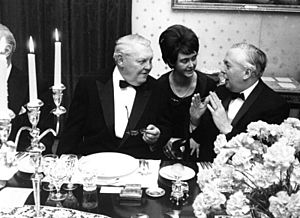
One of Wilson's biggest challenges was whether Britain should join the European Community (EC), which is now the European Union. France's President, Charles de Gaulle, had stopped Britain from joining in 1963.
In 1967, Wilson's government applied for Britain to join the EC again. But de Gaulle said no again in November 1967. After de Gaulle left power, the next Conservative prime minister, Edward Heath, successfully negotiated Britain's entry in 1973.
When Wilson was out of power, he found a way for his party to agree on Europe. They opposed the terms Heath had negotiated but not joining the EC in general. Labour's 1974 election plan promised to renegotiate Britain's membership terms and then hold a referendum (a public vote) on whether to stay. This was the first time such a vote had happened in Britain.
After Wilson returned to power, he and Foreign Secretary James Callaghan renegotiated the terms. The main issue was how much Britain paid to the EC. In the end, other EC members agreed to create a European Regional Development Fund (ERDF), which Britain would benefit from.
In the referendum campaign, government ministers were allowed to support either side. On June 5, 1975, the public voted by a large majority to stay in the EC.
Asia and Africa
Wilson's government avoided sending British troops to the Vietnam War. He offered some support for the US position but did not get involved militarily. He also tried to help mediate the conflict.
In 1968, Wilson announced that British forces would leave military bases East of Suez (like Singapore and Malaysia) by the end of 1971.
Wilson was very supportive of Israel. He was good friends with Israeli Premier Golda Meir.
The "retreat from Empire" continued under Wilson. Southern Rhodesia (now Zimbabwe) was not given independence because its white minority government refused to give equal voting rights to the native African population. The Rhodesian Prime Minister, Ian Smith, declared independence on November 11, 1965. Wilson took the issue to the United Nations, which imposed sanctions (economic penalties) on Rhodesia. Wilson refused to use military force against Rhodesia.
Defeat and Return to Opposition (1970–1974)
By 1969, the Labour Party was losing elections. By 1970, they had lost 16 seats in special elections.
However, by May 1970, the economy was improving, and Labour was ahead in opinion polls. Wilson called a general election. But, to everyone's surprise, the Conservative Party led by Edward Heath won. Most polls had predicted Labour would win. Heath had criticized Wilson over the economy.
Wilson remained the leader of the Labour Party while they were in opposition. In August 1973, while on holiday, he had a small accident where he fell into the sea. He was fine, but the press made a big deal out of it.
The 1970s were a difficult time for the British economy due to global problems like the 1973 oil crisis. Heath's government also faced economic troubles and strikes, especially from coal miners. In February 1974, Heath called a snap election.
Second Period as Prime Minister (1974–1976)
Labour won more seats than the Conservatives in the February 1974 election. This resulted in a "hung parliament" where no party had a clear majority. Since Heath could not form a government with the Liberal Party, Wilson returned to 10 Downing Street on March 4, 1974. He led a minority Labour government. He then called another election in October 1974, which gave Labour a small majority.
A key event during his second term was the referendum on Britain's membership in the European Community (EC) in June 1975. Labour had promised to renegotiate the terms of membership and then let the public decide. The public voted to stay in the EC by a large margin.
Domestic Issues
Wilson's second government greatly expanded the British welfare state. They increased spending on education, health, and housing benefits. To pay for this, they increased taxes on the wealthy. The top tax rate on high incomes was raised to 83%.
However, in 1975, Wilson's government faced criticism as unemployment rose. The number of people out of work passed one million by April that year.
Wilson's second government took office during a difficult time for the British economy, with a global recession and high inflation (prices rising quickly). To deal with inflation, which reached 26% in 1975, the government made a "social contract" with trade unions. This agreement aimed to limit pay raises voluntarily. This policy helped bring inflation down to single figures by 1978.
The government also continued its policy of helping regional development by increasing payments to employers in certain areas.
Northern Ireland
Wilson's first government saw the start of The Troubles in Northern Ireland. In August 1969, Wilson agreed to send the British Army to Northern Ireland to help keep the peace.
In May 1974, Wilson criticized a strike by the Ulster Workers Council in Northern Ireland. He called it a "sectarian strike" that was about old conflicts. He refused to force the British Army to stop the loyalist groups who were causing problems. The strike eventually succeeded in breaking the power-sharing government in Northern Ireland.
In 1975, Wilson secretly offered Libya's leader, Muammar Gaddafi, money to stop arming the Provisional Irish Republican Army. This offer was not known publicly until 2009.
Resignation
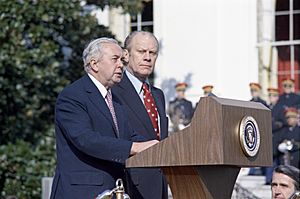
When Wilson became prime minister for the second time, he had already lost some of his enthusiasm for the job. On March 16, 1976, Wilson announced he was resigning as prime minister. His resignation took effect on April 5. He said he had always planned to retire at 60 and was tired.
The Labour Party held an election to choose a new leader. James Callaghan won and became Wilson's successor as prime minister.
Wilson wanted to remain a Member of Parliament after leaving office. He was not immediately given the special title usually offered to retired prime ministers. Instead, he was made a Knight of the Garter. After he left the House of Commons in 1983, he was given a special title as Baron Wilson of Rievaulx. This title honored his hometown of Huddersfield and a nearby abbey.
Retirement and Death (1976–1995)
After retiring as prime minister, Wilson chaired a committee that reviewed how financial institutions worked.
He also appeared on some television shows. He was a lifelong fan of Gilbert and Sullivan operas. In 1978, he appeared on the Morecambe and Wise Christmas Special, a popular comedy show. He appeared on the show again in 1980.
Wilson was not very active in the House of Lords. His last speech there was in 1986. In the same year, he played himself as prime minister in a TV drama.
Harold Wilson continued to attend the House of Lords until about a year before his death. He died on May 24, 1995, at the age of 79. He was buried at St Mary's Old Church in the Isles of Scilly. His gravestone says Tempus Imperator Rerum, which means Time the Commander of Things.
Political Style and Public Image
Wilson saw himself as a "man of the people." He tried to show this image, contrasting himself with the more traditional, upper-class politicians who came before him. He kept his Yorkshire accent. Other parts of his public image included his Gannex raincoat, his pipe, his love for simple food, and his support for his hometown football team, Huddersfield Town.
In June 1965, Wilson had the Beatles given an award called the MBE. This award was popular with young people and made him seem "in touch" with the younger generation. Some people protested, but most supported it. This helped Wilson seem like a modern leader.
Wilson also created some famous phrases. He called the Conservative Party's free market ideas "Selsdon Man." He also famously spoke of "the white heat of the [technological] revolution." Another well-known phrase is "a week is a long time in politics," meaning things can change very quickly in politics.
Reputation
After he left office, Wilson's reputation was not very high for a while. However, over time, his work began to be seen more positively. An opinion poll in 2011 found that Wilson was considered the third-best post-war Labour Party leader.
Honours and Tributes
- In 1969, Wilson was made a Fellow of the Royal Society (FRS) for his important service to science.
- In 2013, the Government of Bangladesh gave Wilson the Friends of Liberation War Honour. This was for his support of the people of Bangladesh during their fight for independence.
Statues and Other Tributes
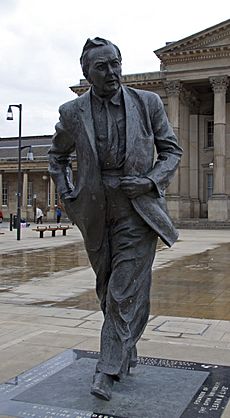
There are two statues of Harold Wilson. The first was unveiled in July 1999 by Prime Minister Tony Blair. It stands outside Huddersfield railway station in Huddersfield. The statue shows Wilson walking, as he looked at the start of his first term as prime minister. His wife, Mary, asked that the statue not show him holding his famous pipe.
A building of high-rise apartments in Huddersfield is named after Wilson.
In September 2006, Tony Blair unveiled a second bronze statue of Wilson in Huyton, near Liverpool. Blair praised Wilson's achievements, including the Open University.
In 2006, a street in Tividale, West Midlands, was named Wilson Drive. It is part of a housing estate where streets are named after former prime ministers.
Scholastic Honours
| Location | Date | School | Position |
|---|---|---|---|
| 1977 | University of Huddersfield | Honorary Fellow | |
| 1966–1985 | University of Bradford | Chancellor |
- Honorary Degrees
| Location | Date | School | Degree |
|---|---|---|---|
| 1964 | Lancaster University | Doctor of Laws (LL.D) | |
| 1965 | University of Liverpool | Doctor of Laws (LL.D) | |
| 1966 | University of Sussex | Doctor of Laws (LL.D) | |
| 1966 | University of Nottingham | Doctor of Laws (LL.D) | |
| 1967 | University of Essex | Doctorate | |
| 18 May 1974 | Open University | Doctor of the University (D.Univ) | |
| 1976 | Bar-Ilan University | Doctor of Philosophy (Ph.D) |
Images for kids
See also
 In Spanish: Harold Wilson para niños
In Spanish: Harold Wilson para niños
- History of the Labour Party (UK)
- Lord Goodman
 | Selma Burke |
 | Pauline Powell Burns |
 | Frederick J. Brown |
 | Robert Blackburn |


